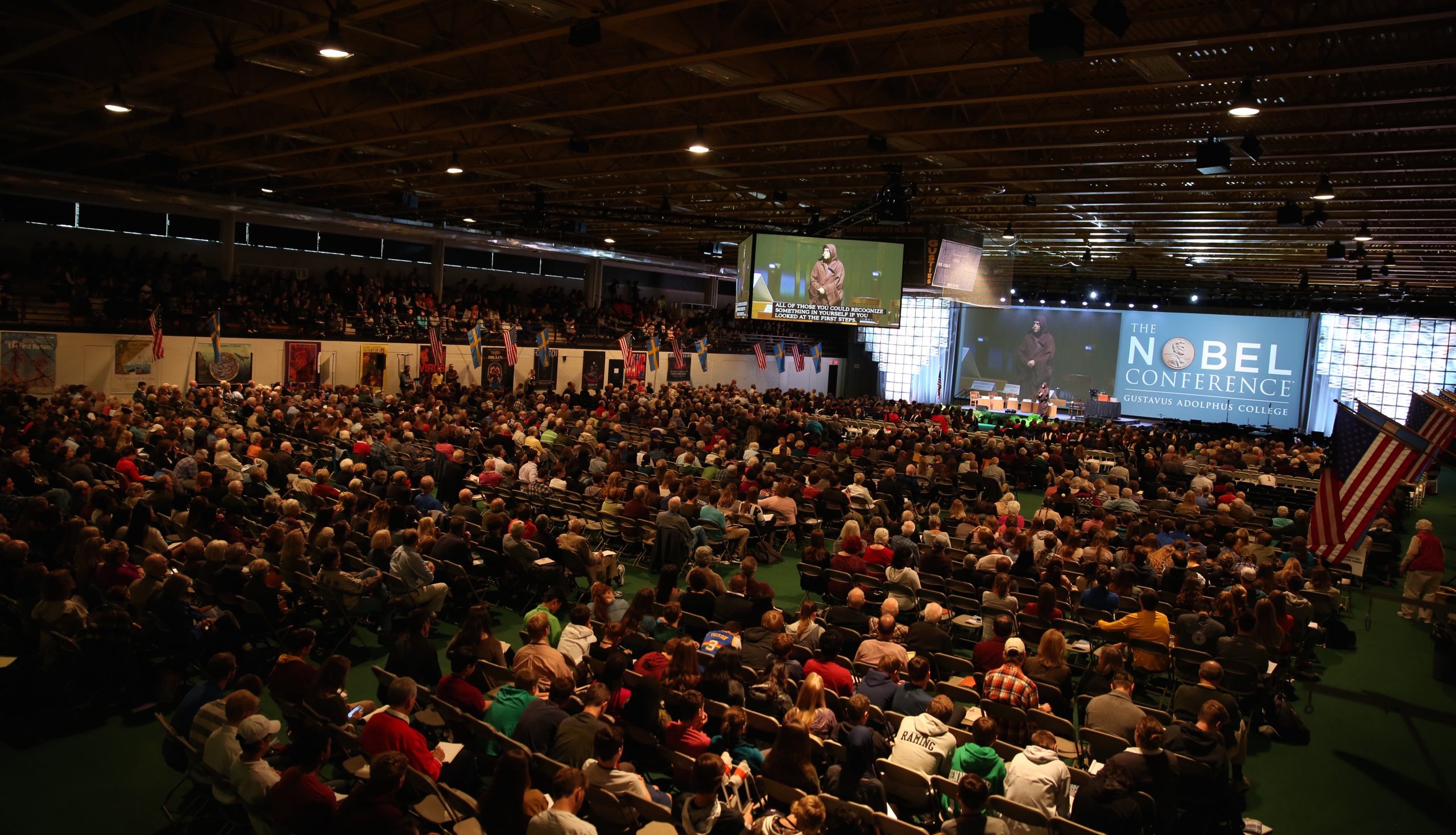“In case you haven’t noticed, politicians lie a lot.”
And with that, behavioral economist Dan Ariely opened the first of the lectures of the 52nd Nobel Conference: In Search of Economic Balance. This year’s highly relevant theme was filled with lively debate of intellectual and moral complexity, centered squarely in the ethics of our increasingly global economics.
The Conference was attended by thousands of students, lifelong learners, and citizens of Minnesota, the Midwest, and beyond. Audiences from 36 states and 14 countries on three continents tuned in live online. All heard from leading economics scholars regarding their research. On campus, visitors also enjoyed interactive games about economics concepts and took photos (sort of) with past and present economics superstars like Karl Marx and Janet Yellen.
“I didn’t know what to expect with economics, but I was surprised how relevant it was to not only my life but to topics that I am interested in. It wasn’t just theory, it was related to world issues and things I care about.” —Laura Isdahl ’17, English major
The topic of global economics was a surprisingly accessible one thanks to the visiting scholars.
First was Ariely, who dressed as a Jedi and used jokes and topical experiments to illustrate how social values influence behavior. For instance, in one study, students were asked to recite the 10 Commandments. Most couldn’t, but after they tried none of them cheated.
 Orley Ashenfelter described the “Big Mac Per Hour” rate as an indicator of wealth inequality among workers in a country. In India, for instance, it takes McDonald’s workers nearly four hours to earn enough for one Big Mac. U.S. wages are better, but there is as much as a 30 percent wage difference across regions. Visitor Viktor Tronin, an international student from Moscow studying at Augustana College in Souix Falls, noted, “I liked this international perspective. His talk reminded me of my macroeconomics course at the New Economic School in Moscow.”
Orley Ashenfelter described the “Big Mac Per Hour” rate as an indicator of wealth inequality among workers in a country. In India, for instance, it takes McDonald’s workers nearly four hours to earn enough for one Big Mac. U.S. wages are better, but there is as much as a 30 percent wage difference across regions. Visitor Viktor Tronin, an international student from Moscow studying at Augustana College in Souix Falls, noted, “I liked this international perspective. His talk reminded me of my macroeconomics course at the New Economic School in Moscow.”
Theologian Joerg Reiger asked what place Jesus would occupy on Wall Street. “He had some radical things to say, but he was also an organizer,” Reiger said. “He brought people together and he brought power.” And he did so during the Roman Empire, when the top one percent controlled 16 percent of the wealth. In the U.S. today, the top one percent control 40 percent of the wealth, he said.
In the evening, small groups met for up-close, in-depth discussion with the day’s speakers, as well as Sir Paul Collier (of University of Oxford), Chris Farrell (of American Public Media’s Marketplace), and Jan Lindman (Treasurer to the King, The Royal Court of Sweden). Others attended an esteemed panel of notable Minnesota business and civic leaders talking “Tales from the Tightrope: Economic Balance in Everyday Life,” which included Margaret Anderson Kelliher ’90, Jodie Harpstead, Anne Krisnik, Robert LaBombard, and Ytive Prafke. It was moderated by Matt Kusilek ’98.
Day two of the Conference opened with Collier praising the Conference for its egalitarian approach to intellectual discourse. He went on to describe the complexities of creating economic opportunity in African countries under differing notions of self-interest, self-esteem, and peer esteem. He gave a rousing cry for Americans to flush out financial holdings that have no public beneficial ownership, and he received several standing ovations for it.
“Yes, I am a knight of the British Empire—the British Empire hasn’t existed in my lifetime, and a knight is out of the Middle Ages. But my parents left school when they were 12. I am a first-generation college student. That’s why I believe in conferences like this, which are for everyone.” —Sir Paul Collier, professor of economics and public policy at the Blavatnik School of Government at the University of Oxford
Economist John List, the son of a Wisconsin trucker who financed his first economics research with his baseball card collection, described his field experiments on early childhood education in Chicago. “We have been at this a long time and we still don’t know how to fix public education,” he said. But his experiments have shown great insights into teacher incentives, curriculum approaches, and parental engagement—all of which could help close education achievement gaps.
Deirde McCloskey, a self-described “humanomist” (humanist + economist), talked about the historical presence of the liberal idea (liberal = equality, liberty, and justice) and its role in the growth of wealth since the 18th century. Because it is liberal ideas that enriched the world, she said, “It is possible to be deeply ethical and still be an actor in the economy.”
At the evening’s banquet, Farrell delivered an after-dinner talk on economic inclusion, citing his experiences as a journalist and other journalists’ experiences as well. He was “cautiously optimistic” about the future, but enthusiastically noted that the past few days of talking about economics with leading economists, “has been heaven for me.”
He wasn’t the only one who felt that way.
Video of the Conference is reviewable via YouTube and Facebook.
Next year’s Conference—Reproductive Technology: How Far Will We Go?—takes place October 3 and 4, 2017.
Follow the Nobel Conference on Twitter and Facebook for updates throughout the year.

Leave a Reply